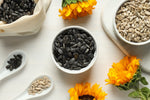
Sunflower Seeds: Nutritious Snacks Rich in Vegan Protein
, by Sandesh Prasannakumar, 10 min reading time
New Year Sale Is Live - Shop Now!
New Year Sale Is Live - Shop Now!
New Year Sale Is Live - Shop Now!
New Year Sale Is Live - Shop Now!
New Year Sale Is Live - Shop Now!
New Year Sale Is Live - Shop Now!
New Year Sale Is Live - Shop Now!
New Year Sale Is Live - Shop Now!
New Year Sale Is Live - Shop Now!
New Year Sale Is Live - Shop Now!

, by Sandesh Prasannakumar, 10 min reading time
Sunflower seeds are actually the nuts that are located inside of the hard black and white striped outer husk of the sunflower plant. These barely distinguishable ‘peanut’ seeds are full of vitamins and proteins that are fit for eating at school, at work, or while watching a movie. Regarding the caloric concentration and the nutritional/caloric ratio, to be more precise, nutritionally, these sunflower seeds are provided with vitamins and minerals, with proteins and other important elements or compounds needed in a person’s diet and vital to restore and maintain his health.
Sunflower seeds are also a great source of minerals and vitamins, to illustrate, 1/4 cup of sunflower seeds contain DV of selenium of more than 30%, DV of Vitamin E of more than 23%, and Manganese of over 22%. It likewise comprises magnesium, phosphorus, B vitamins, vitamin K, folate, and several other minerals. Based on a serving of the seeds, sunflower seeds actually measure in at 0.45 grams of fat per serving and approximately 6 grams of protein, and this classifies it as one of the best vegan proteins. The protein found in sunflower seeds is said to fall under the first-rate protein because hard seeds from sunflowers are known to possess moderate amounts of lysine, which is an amino acid that is usually lacking in most plant seeds. Besides protein, sunflower seeds also provide a variety of other key nutrients:
In addition to their stellar nutritional profile, sunflower seeds confer a number of science-backed health advantages:
Here are some simple tips for incorporating sunflower seeds into your diet:
Given their nutritional benefits, ease of use, cost, and shelf life, sunflower seeds can be the best option for a quick snack in homes, offices, or other places of work or even when people are on the go. It is recommended only to consume a few – just one handful per day – to start noticing positive changes.
Delicious, universally acceptable, and packed with nutrients, they are easy, healthy snacks for those who prefer vegetarian vegan diets or need an energy boost during intensive workouts. Two small handfuls a day have a range of positive effects on the heart and skin, inflammation levels, and even energy levels. Sunflower seeds are useful in the kitchen due to their great source of nutrition and convenience in preparing them. It’s also helpful to save some raw shelled seeds for any time when sudden plant-based protein-rich snacking and cooking are required.
For best quality vegan protein supplement, visit Genetic Nutrition!
Raw seeds contain more of this vitamin since, during roasting, some vitamins like vitamin E are known to degrade slightly. However, roasting enhances flavor. Roasted sunflower seeds, like raw ones, are also full of nutrients.
A 100-calorie or a quarter cup of sunflower seeds contains about a quarter of your daily requirement of protein, which is nearly six grams. This protein has many functional responsibilities in the human body, some of which are muscle and tissue formation and rebuilding.
Nonetheless, sunflower seeds are packed with the plant-based omega-3 called ALA or alpha-linolenic acid, though it is only 0. 5 g per oz. There are other vegan Omega-3 foods that are much superior to linseed oil, and these include flax seed, walnut, soy products, hemp seeds, and Broccoli that contain more than 2 grams of Omega-3 per portion.
Yes. There is also a possibility of allergy to sunflower seed, but this is relatively rare, most particularly when an individual has an allergy to related pollen, such as that of ragweed and marigolds. The common manifestations of this poison are stomach pain, nausea and vomiting, itching, rash, shortness of breath, and hypotension. Still, one has to be careful because nut-allergic persons can still take sunflower seeds, but there are some overlaps in allergens.